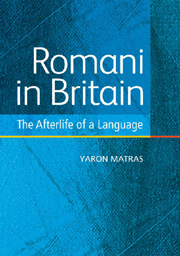Book contents
- Frontmatter
- Contents
- List of Figures, Tables and Maps
- List of Abbreviations
- Preface
- 1 Angloromani: A Different Kind of Language?
- 2 The Roots of Romani
- 3 The Historical Position of British Romani
- 4 The Structural Composition of Angloromani
- 5 The Conversational Functions of Angloromani
- 6 Conclusions: The Decline, Death and Afterlife of a Language
- Appendix I Lexicon of Angloromani
- Appendix II Predecessor expressions by origin
- References
- Author Index
- Subject Index
6 - Conclusions: The Decline, Death and Afterlife of a Language
Published online by Cambridge University Press: 12 September 2012
- Frontmatter
- Contents
- List of Figures, Tables and Maps
- List of Abbreviations
- Preface
- 1 Angloromani: A Different Kind of Language?
- 2 The Roots of Romani
- 3 The Historical Position of British Romani
- 4 The Structural Composition of Angloromani
- 5 The Conversational Functions of Angloromani
- 6 Conclusions: The Decline, Death and Afterlife of a Language
- Appendix I Lexicon of Angloromani
- Appendix II Predecessor expressions by origin
- References
- Author Index
- Subject Index
Summary
Opinions are split as to what constitutes the most appropriate format for describing Para-Romani varieties. The more traditional mode of documenting them has been in the form of a dictionary or word list, perhaps accompanied by some example phrases indicating the manner in which words are embedded structurally in sentences in the mainstream or ‘host’ language. Others have attempted to write proper reference grammars of Para-Romani varieties, emphasising both the presence of creative word formation strategies and some features that differ from the typical structures of the host language (see Ladefoged 1998, Carling's contribution to Lindell & Thorbjörnsson-Djerf 2008). In a brief contribution to the BBC's online language documentation programme Voices, published in 2006 (http://www.bbc.co.uk/voices/), I referred to Angloromani as a ‘phenomenon’ that involved the use of Romani-derived lexicon in an English conversation framework. At least one reader was apparently irritated by my use of the term ‘phenomenon’ and posted a comment on the website emphasising that “Far from being a “phenomenon” the language is alive and well > I wish the BBC had asked a British Traveller for a view and they would have got it from the Gry's mui {the horse's mouth}” (‘Jacqueline from Suffolk’, http://www.bbc.co.uk/voices/ multilingual/romani.shtml; last accessed December 2009).
- Type
- Chapter
- Information
- Romani in BritainThe Afterlife of a Language, pp. 167 - 175Publisher: Edinburgh University PressPrint publication year: 2010



